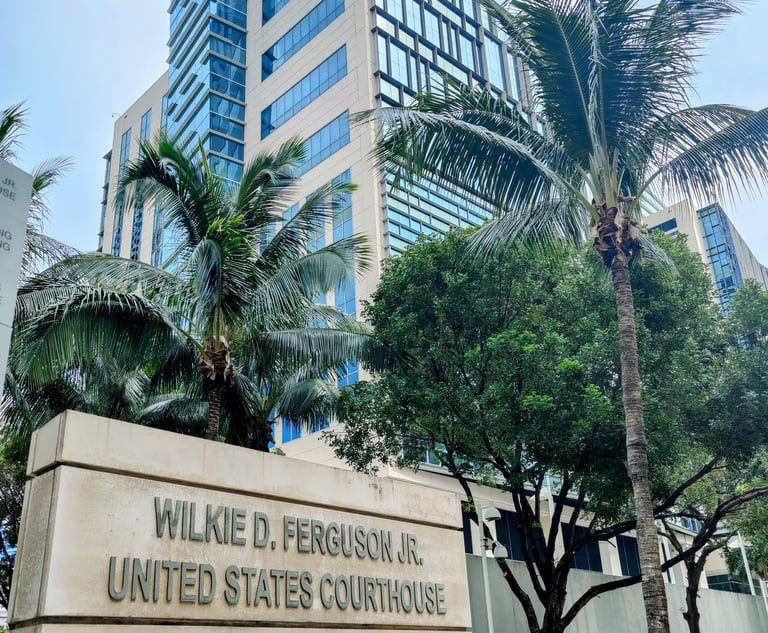 Aerial footage of pre-harvest burns near in southern Florida.
Aerial footage of pre-harvest burns near in southern Florida.Florida Class Action Alleges Sugarcane Growers Took Less Care When Burning Fields in Poor Neighborhoods
The lawsuit alleges that the smoke from the millions of acres of burning sugarcane exposes residents to a wide range of pollutants.
June 23, 2020 at 05:29 PM
4 minute read
Attorneys from Hagens Berman and Berman Law Group are representing residents in a proposed class-action lawsuit against several major growers in southern Florida over alleged toxic smoke from sugarcane burning.
And they allege the growers took fewer precautions in poorer neighborhoods.
The complaint names as defendants Florida Crystals Corp., Sugar Cane Growers Cooperation of Florida, United States Sugar Corp., Okeelanta Corp., Osceola Farms Co., Sugarland Harvesting Co., Trucane Sugar Corp., Independent Harvesting Inc. and J&J Ag. Products Inc.
It alleges the major Florida sugarcane growers burned about 3.2 million acres between 2009 and 2019. It also claims those activities created a "hazard zone" as allegedly toxic smoke blanketed Belle Glade, Canal Point, Clewiston, Indiantown, Moore Haven, Pahokee and South Bay, covering houses and cars with soot and cane residue.
The people living here are among the poorest communities in Florida, according to the amended complaint.
But the growers deny endangering residents. They say the burns are part of safe agricultural practices that rid the land of debris to make way for new crops.
Now, U.S. District Judge Rodney Smith in the Southern District of Florida must decide whether to grant certification to three classes.
The amended complaint lists three proposed classes: a "battery class," for all residents in the areas "hardest hit by sugarcane burning;" a "medical monitoring class," for residents over the age of 40 who are allegedly at increased risk of cancer due to their exposure; and a "property owner class," for parties who own and suffered property damage within the hardest-hit areas.
The lawsuit alleges that the smoke from the millions of acres of burning sugarcane exposes residents to a wide range of pollutants, including particulate matter, dioxins, polycyclic aromatic hydrocarbons, volatile organic compounds, carbon monoxide, sulfur oxides, nitrogen oxides, ammonia, elemental carbon and organic carbon.
|Alleged disparity
Steve Berman, the managing partner of Hagens Berman in its Seattle office, said the victims are primarily in two social-economic classes. Berman opined that there needs to be just as much scrutiny on the permits sugarcane growers are issued in southern Florida for the wealthier areas than those that are issued in the poorer areas.
 Sugarcane field burns near Belle Glades.
Sugarcane field burns near Belle Glades.
But Gaston Cantens, vice president of the Florida Crystals Corp., said the amended complaint has no merit and is similar to the original lawsuit that the court dismissed.
"Florida Crystals, which is celebrating its 60th anniversary as a member of the Glades farming community, remains committed to safe harvesting practices under the program administered by the Florida Forest Service that authorizes prescribed burns statewide," Cantens said.
The defendants claimed the sugarcane burning cleared the fields of excess organic matter and made harvesting more efficient. A majority of the sugarcane burning has taken place in Palm Beach County.
|'They acted with impunity'
But the amended complaint stated the communities most affected by the burning ring the southern shore of Lake Okeechobee.
For instance, those who live in the affluent eastern Palm Beach and eastern Martin counties have warnings from first responders when smoke is blown to their area, according to the suit. However, it alleged that public health officials give little warning when the wind blows toward more impoverished areas, such as Hendry and Glades counties.
|Read the amended class action complaint:
|The amended complaint stated that pre-harvest burning is no longer necessary. It claimed the defendants viewed this method of farming as cheaper and more efficient. But plaintiffs argued that sugarcane growers worldwide have increasingly abandoned that method in favor of green harvesting or mulching their plant waste.
Berman is asking the court to hold the major Florida sugarcane growers accountable for alleged misconduct, especially in impoverished areas.
"These sugarcane owners know the smoke is toxic. They know it is going off their land to other people's land, and they acted with impunity," Berman said, "The takeaway is you can't do that to someone. Not in our country."
This content has been archived. It is available through our partners, LexisNexis® and Bloomberg Law.
To view this content, please continue to their sites.
Not a Lexis Subscriber?
Subscribe Now
Not a Bloomberg Law Subscriber?
Subscribe Now
NOT FOR REPRINT
© 2024 ALM Global, LLC, All Rights Reserved. Request academic re-use from www.copyright.com. All other uses, submit a request to [email protected]. For more information visit Asset & Logo Licensing.
You Might Like
View All
'Close Our Borders?' Senate Judiciary Committee Examines Economics, Legal Predicate for Mass Deportation Proposal
3 minute read

'Stab Venequip in the Back': Caterpillar Faces $100M Lawsuit in Miami Federal Court
3 minute read
Another Roundup Trial Kicks Off in Missouri. Monsanto Faces 3 Plaintiffs
4 minute readLaw Firms Mentioned
Trending Stories
- 1'Largest Retail Data Breach in History'? Hot Topic and Affiliated Brands Sued for Alleged Failure to Prevent Data Breach Linked to Snowflake Software
- 2Former President of New York State Bar, and the New York Bar Foundation, Dies As He Entered 70th Year as Attorney
- 3Legal Advocates in Uproar Upon Release of Footage Showing CO's Beat Black Inmate Before His Death
- 4Longtime Baker & Hostetler Partner, Former White House Counsel David Rivkin Dies at 68
- 5Court System Seeks Public Comment on E-Filing for Annual Report
Who Got The Work
Michael G. Bongiorno, Andrew Scott Dulberg and Elizabeth E. Driscoll from Wilmer Cutler Pickering Hale and Dorr have stepped in to represent Symbotic Inc., an A.I.-enabled technology platform that focuses on increasing supply chain efficiency, and other defendants in a pending shareholder derivative lawsuit. The case, filed Oct. 2 in Massachusetts District Court by the Brown Law Firm on behalf of Stephen Austen, accuses certain officers and directors of misleading investors in regard to Symbotic's potential for margin growth by failing to disclose that the company was not equipped to timely deploy its systems or manage expenses through project delays. The case, assigned to U.S. District Judge Nathaniel M. Gorton, is 1:24-cv-12522, Austen v. Cohen et al.
Who Got The Work
Edmund Polubinski and Marie Killmond of Davis Polk & Wardwell have entered appearances for data platform software development company MongoDB and other defendants in a pending shareholder derivative lawsuit. The action, filed Oct. 7 in New York Southern District Court by the Brown Law Firm, accuses the company's directors and/or officers of falsely expressing confidence in the company’s restructuring of its sales incentive plan and downplaying the severity of decreases in its upfront commitments. The case is 1:24-cv-07594, Roy v. Ittycheria et al.
Who Got The Work
Amy O. Bruchs and Kurt F. Ellison of Michael Best & Friedrich have entered appearances for Epic Systems Corp. in a pending employment discrimination lawsuit. The suit was filed Sept. 7 in Wisconsin Western District Court by Levine Eisberner LLC and Siri & Glimstad on behalf of a project manager who claims that he was wrongfully terminated after applying for a religious exemption to the defendant's COVID-19 vaccine mandate. The case, assigned to U.S. Magistrate Judge Anita Marie Boor, is 3:24-cv-00630, Secker, Nathan v. Epic Systems Corporation.
Who Got The Work
David X. Sullivan, Thomas J. Finn and Gregory A. Hall from McCarter & English have entered appearances for Sunrun Installation Services in a pending civil rights lawsuit. The complaint was filed Sept. 4 in Connecticut District Court by attorney Robert M. Berke on behalf of former employee George Edward Steins, who was arrested and charged with employing an unregistered home improvement salesperson. The complaint alleges that had Sunrun informed the Connecticut Department of Consumer Protection that the plaintiff's employment had ended in 2017 and that he no longer held Sunrun's home improvement contractor license, he would not have been hit with charges, which were dismissed in May 2024. The case, assigned to U.S. District Judge Jeffrey A. Meyer, is 3:24-cv-01423, Steins v. Sunrun, Inc. et al.
Who Got The Work
Greenberg Traurig shareholder Joshua L. Raskin has entered an appearance for boohoo.com UK Ltd. in a pending patent infringement lawsuit. The suit, filed Sept. 3 in Texas Eastern District Court by Rozier Hardt McDonough on behalf of Alto Dynamics, asserts five patents related to an online shopping platform. The case, assigned to U.S. District Judge Rodney Gilstrap, is 2:24-cv-00719, Alto Dynamics, LLC v. boohoo.com UK Limited.
Featured Firms
Law Offices of Gary Martin Hays & Associates, P.C.
(470) 294-1674
Law Offices of Mark E. Salomone
(857) 444-6468
Smith & Hassler
(713) 739-1250






